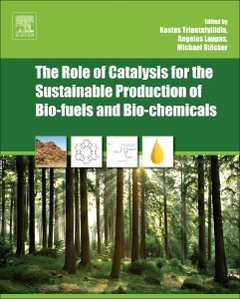The Role of Catalysis for the Sustainable Production of Bio-fuels and Bio-chemicals
Coordonnateurs : Triantafyllidis Kostas, Lappas Angelos, Stöcker Michael

The Role of Catalysis for the Sustainable Production of Bio-fuels and Bio-chemicals describes the importance of catalysis for the sustainable production of biofuels and biochemicals, focused primarily on the state-of-the-art catalysts and catalytic processes expected to play a decisive role in the "green" production of fuels and chemicals from biomass. In addition, the book includes general elements regarding the entire chain of biomass production, conversion, environment, economy, and life-cycle assessment.
Very few books are available on catalysis in production schemes using biomass or its primary conversion products, such as bio-oil and lignin. This book fills that gap with detailed discussions of:
- Catalytic pyrolysis of lignocellulosic biomass
- Hybrid biogasoline by co-processing in FCC units
- Fischer-Tropsch synthesis to biofuels (biomass-to-liquid process)
- Steam reforming of bio-oils to hydrogen
With energy prices rapidly rising, environmental concerns growing, and regulatory apparatus evolving, this book is a resource with tutorial, research, and technological value for chemists, chemical engineers, policymakers, and students.
1. A general introduction to Biomass utilization possibilities (Paul O'Connor) 2. Biomass Composition and its Relevance to Biorefining (Daniel J.M. Hayes) 3. Catalytic upgrading of fats and vegetable oils for the production of fuels (Victor Teixeira da Silva, Leandro A. Sousa) 4. Heterogeneous catalysis for biodiesel production (Simona M. Coman, Vasile I. Parvulescu) 5. Catalytic pyrolysis of lignocellulosic biomass (Atte Aho, Tapio Salmi, Dmitry Yu. Murzin) 6. Pathways and Mechanisms of biomass fast pyrolysis. Impact on catalyst research (M.M. Ramirez-Corredores) 7. The role of catalytic pretreatment in biomass valorization towards fuels and chemicals (Christos K. Nitsos, Chrysa M. Mihailof, Konstantinos A. Matis, Angelos A. Lappas, Kostas S. Triantafyllidis) 8. Role of acid catalysis in the conversion of lignocellulosic biomass to fuels and chemicals (Elif Gurbuz, Jesse Q. Bond, James A. Dumesic, Yuriy Roman-Leshkov) 9. Catalytic depolymerisation and deoxygenation of lignin (Chen Zhao, Johannes A. Lercher) 10. Tomorrow's biofuels: hybrid biogasoline by co-processing in FCC units (Yves Schuurman, Gabriella Fogassy, Claude Mirodatos) 11. Catalytic hydrotreament of bio-oils for high quality fuel production (Rune Lodeng, Lenka Hannevold, Hakon Bergem, Michael Stocker) 12. Fischer-Tropsch synthesis to biofuels (BtL process) (Reinhard Rauch, Alain Kiennemann, Anca Sauciuc) 13. Integrating White Biotechnology in lignocellulosic biomass transformations: From enzyme-catalysis to metabolic engineering (Fabrizio Sibilla, Pablo Dominguez de Maria) 14. Steam reforming of bio-oils to hydrogen (A.A. Lemonidou, P. Kechagiopoulos, E. Heracleous, S. Voutetakis) 15. Photocatalytic production of renewable hydrogen (Dimitris I. Kondarides, Xenophon E. Verykios) 16. Catalytic transformation of CO2 to fuels and chemicals, with reference to biorefineries (Gabriele Centi, Siglinda Perathoner) 17. The role of heterogeneous catalysis in the Biorefinery of the future (Juan Carlos Serrano-Ruiz, Rafael Luque, James H. Clark)
Chemists and Chemical Engineers, Biochemical Engineers, academics, research students, post graduate and graduate students and industrial researchers in these areas of study. Environmental Engineers, Biochemists, Petroleum Engineers, post graduate and research students in these areas. And government officials and advisors, policy makers
His research interests focus on the synthesis and characterization of nanoporous materials, organic-inorganic hybrid materials and nanocomposites, heterogeneous & environmental catalysis, thermochemical, catalytic and enzymatic conversion of biomass to fuels and chemicals, adsorption/separation processes. He is the author/co-author of 50 scientific journal publications, of more than 100 publications in conference proceedings and the co-inventor of two patents. He has presented more than 40 lectures in national and international scientific conferences and has participated in more than 20 national and European research projects as scientific coordinator or principal researcher
Angelos Lappas is Research Director at the Chemical Process Engineering Research Institute (CPERI) of the Centre for Research and Technology-Hellas (CERTH). He joined CPERI in 1993 after receiving his BSc and a PhD degree in Chemical Engineering from the Aristotle University of Thessaloniki. Angelos Lappas is in charge of the Laboratory of Environmental Fuels and Hydrocarbons (50 people) in CPERI. He kept positions as teaching assistant in the Aristotle University of Thessaloniki and the Technological Institute of Thessaloniki.
Angelos Lappas has implemented more than 25 EU and National research projects and more than 50 industrial contracts, as scientific coordinator. His research fields are: catalytic reaction engineering, refining processing,
- Includes catalytic reaction mechanism schemes and gives a clear understanding of catalytic processes
- Includes flow diagrams of bench-, pilot- and industrial-scale catalytic processing units and demonstrates the various process technologies involved, enabling easy selection of the best process
- Incorporates many tables, enabling easy comparison of data based on a critical review of the available literature
Date de parution : 03-2013
Ouvrage de 608 p.
19x23.3 cm
Thèmes de The Role of Catalysis for the Sustainable Production of... :
Mots-clés :
biomass; biodiesel production; pyrolysis; vegetable oils; bio-oils; lignin; hydrogen production



